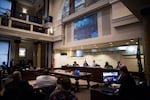Portland's City Club wants to talk about the structural problem with our government. No, not PERS, or the lack of a statewide sales tax.
The commission system.
In a report released Sunday, a research team convened by the civic group recommends a complete overhaul of Portland's unusual form of government.
Portland is the last large American city still using a commission system, in which members of the City Council are elected citywide and serve a dual role as legislators and administrators of individual bureaus.
The City Club’s research committee found that the system “is inherently inequitable and has long since ceased to be the most effective form of government for Portland.”
The report could be the first salvo in a new campaign to convince voters to abandon the commission system. In the next two years, the City Council has to convene a group of 20 citizens to review the city’s charter and recommend changes to put to voters for approval.
Mayor Ted Wheeler says he supports changing the form of government — if voters approve it.
“Even Galveston, Texas, where this form of government was invented, evolved to a more modern form of government in 1960,” he said.

The Portland City Council hearing on Thursday, Feb. 8, 2019, that resulted in the passing of a resolution condemning white supremacists and alt-right hate groups.
Erica Morrison / OPB
Portland’s commission system and at-large elections have long been viewed as problematic by Portland’s mayors and by groups concerned with equity.
“There are areas that don’t get the same access to decision-making,” said former Portland Mayor Tom Potter, who led the last major effort to ditch the commission system.
“Talk to most people of color, and they’ll say they don’t feel represented. You can talk to people living east of 82nd and they’ll say there’s nobody out here who really represents us.”
But voters have remained stubbornly supportive of it. Proponents view it as a point of civic pride, a way to prevent the mayor from holding too much power, and a system that has helped the city lead on environmental issues and other policies that are citywide priorities without a geographic focus.
Efforts to change it have either failed to qualify for the ballot or have been defeated at least five times: in 1950, 1958, 1966, 2002, 2007. Most recently, in 2016 East Portland voters failed to gather enough signatures to put an initiative for district representation on the ballot.
The City Club’s report recommends hiring a professional city manager to run bureaus and oversee day-to-day services, increasing the size of the City Council, and electing that council using districts, instead of having candidates run citywide.
Those recommendations are a change of tune from the civic organization, which helped defeat the last effort to ditch the commission system in 2007.
“I’m glad that they have come around,” Potter said. “I think partly it's due to change in leadership and the makeup of the City Club itself. People are coming with a different set of experiences and views about government.”
The commission system was first developed in Galveston, Texas, after a hurricane and was popular with progressive reformers around the turn of the century who believed it helped limit corruption. Portland adopted it in 1913. Most cities abandoned it as professional civil service corps replaced patronage forms of government.
According to the City Club’s report, critics say the system leads Commissioners to focus on their bureaus at the expense of citywide priorities – for example, defending their bureaus against budget cuts. It can also be confusing for residents trying to resolve a problem or advocate for themselves to figure out who to contact.
But the research team’s central argument against the commission system is that it necessitates citywide elections. Otherwise, a commissioner elected in a particular neighborhood who is empowered to oversee, for example, the Parks Bureau, has an obvious incentive to provide better parks in their district than in other parts of the city.
A significant body of political science research and numerous court cases have shown that at-large elections can make it harder for women and people of color to win. As the report puts it:
“The inherent bias in the current two-stage, at-large election system not only disadvantages people of color, but also anyone who is not from a privileged, white, male background. Only nine women have served, and—up to now—none of them have been women of color. Portland residents who rent their homes, who have lower incomes, and who live in the eastern and northern portions of the city are similarly drastically underrepresented. Though the witnesses interviewed by the committee presented a broad range of viewpoints and opinions, there was zero disagreement about this essential facet of the status quo.”
The report suggests that simply switching from at-large to district-based elections will not, on its own, guarantee better, more equitable representation in Portland, particularly given the city’s comparatively small population of people of color.
It recommends creating a relatively small number of districts, with multiple council members elected per district, “allowing underrepresented groups more power to boost individual candidates.”

Commissioner Jo Ann Hardesty greets a young supporter on her first day in office at Portland City Hall.
Amelia Templeton / OPB
Portlanders can look to Seattle for a taste of how district representation could change local political dynamics.
Seattle now elects seven of its nine city council members by district, a voter-approved change that went into effect in 2015.
That's prompting candidates for the city's upcoming election to shift their focus to hyperlocal issues in an effort to appear responsive to their districts, according to reporting from Crosscut.
